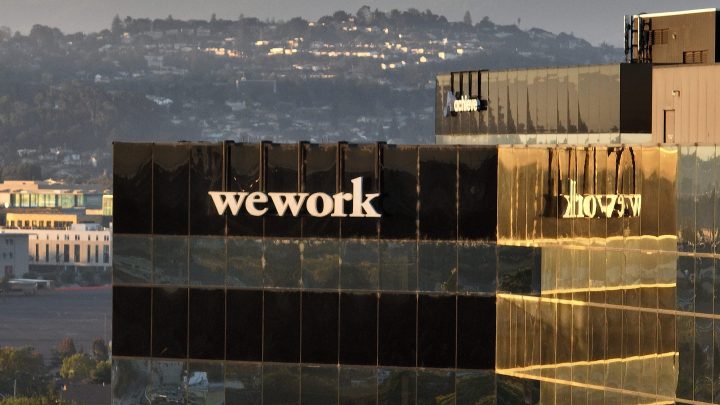
WeWork could declare bankruptcy anytime, but how is it still around?
WeWork could declare bankruptcy anytime, but how is it still around?

The Wall Street Journal reported Tuesday that WeWork could be filing for bankruptcy as soon as next week. The company became known first for its stylish co-working spaces, and then for its spectacular implosion ahead of an IPO planned for 2019, when its valuation reached a high of $47 billion. Its descent into likely Chapter 11 has felt so inevitable, perhaps the question is not “Why?” but “What took so long?”
The story of WeWork’s meteoric rise and equally dramatic fall has spawned think pieces, podcasts, documentaries and an Apple TV+ series — “WeCrashed,” starring Jared Leto and Anne Hathaway.
Professor Erik Gordon at the University of Michigan has used WeWork as a case study in business classes.
“I think there are two sort of surprise miracles here. One, that this company was able to get so big to begin with, and two, that it has survived on fumes all these years,” Gordon said.
Really, he said, it’s survived on the giant pile of cash it got from investors like SoftBank. In 2019, WeWork scrapped its IPO and ousted its now famously eccentric founder, Adam Neumann. It then restructured and went public in 2021 through a merger with a special purpose acquisition company.
“And here’s the company’s pitch: ‘We’ve got some adults in the room now, and it’s a new company,'” Gordon said.
But he said WeWork’s business model has always been shaky.
And it’s only gotten shakier since COVID-19 came along to weaken the commercial real estate market, said Jeffrey Havsy at Moody’s Analytics.
“WeWork has its own set of challenges compared to some of the other flexible office space providers,” Havsy said. Namely, expanding too fast — signing scores of long-term leases it later couldn’t afford.
Jamie Hodari, head of WeWork competitor Industrious, said his company does it differently by mostly partnering with building owners to manage flexible office space rather than lease it out.
“One of the great ironies of this moment is that the flex market, pretty much everywhere in the world, is having record performance,” Hodari said.
That’s because many employers are rethinking their permanent offices and using more flexible space.
There’s a lot happening in the world. Through it all, Marketplace is here for you.
You rely on Marketplace to break down the world’s events and tell you how it affects you in a fact-based, approachable way. We rely on your financial support to keep making that possible.
Your donation today powers the independent journalism that you rely on. For just $5/month, you can help sustain Marketplace so we can keep reporting on the things that matter to you.

















